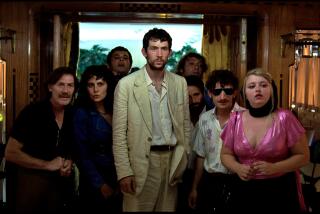CHILD OF PARADISE Marcel Carne and the Golden Age of French Cinema<i> by Edward Baron Turk(Harvard: $37.50; 434 pp.) </i>
- Share via
Marcel Carne is best known as the director of “Children of Paradise,” a wistful film about a 19th- Century Parisian theater troupe that would capture the attention of its bored and beleaguered audiences by acting out sensational tragedies, but also by inspiring hope. While released in 1945, “Children of Paradise” still appears on many a movie critic’s 10-best list, and it helped make Carne France’s most honored film director. Ironically, though, Carne has been cast out of French culture even amid all of his honors: The French government has refused him all but the most meager support for his films and Carne appears a bitter man in interviews, contending that “little arrivistes “ such as Francois Truffaut and Jean Luc Goddard plotted to bring him down.
In Carne’s predicament, Edward Turk, a French culture instructor at MIT, has discovered a compelling story about the attitudes of the French toward their own history and of the West toward art. At the center of the controversy is Carne’s refusal to leave France when the Germans marched in during World War II. Carne was France’s leading young film maker at the time, and while he was by no means a Fascist collaborator, his continued film-making, many feel, gave the mistaken impression that culture continued to thrive under the Occupation. Efforts to banish Carne from France’s cultural mainstream, Turk argues persuasively, have been attempts to exorcise a “distasteful part of France’s political and historical identity”: the fact that many French people took no clear position on France’s plight during the Occupation.
And yet, while Turk acknowledges that “Carne was insensitive to the similarities between his cinematic distillation of rarefied truths and Nazism’s pursuit of a sanitized reality,” he points out that “Children of Paradise” offered a genuine, if symbolic, resistance to the Occupation. Garance, for example, the beautiful woman who captures the heart of many of the film’s characters, has a name that not coincidentally rhymes with “La France” and a character that “embodies the vitality, self-esteem and pragmatism associated with the Popular Front spirit.” “Children of Paradise” ends as Garance is carried away forever from her lover and friends. Turk argues, however, that we shouldn’t dismiss Carne’s affirmative role in French history because of his fatalistic philosophy, for his films “bear out the Baudelairean view of sorrow and melancholy as fundamental components of art. They confirm that an individual’s consciousness of loss, exile and impossibility can engender works of profound beauty.”
More to Read
Only good movies
Get the Indie Focus newsletter, Mark Olsen's weekly guide to the world of cinema.
You may occasionally receive promotional content from the Los Angeles Times.










